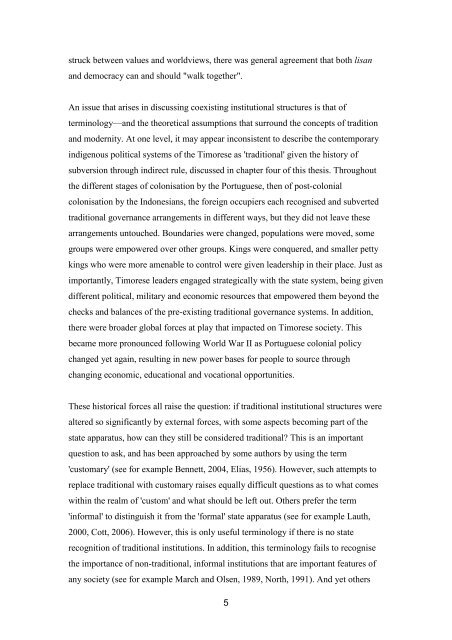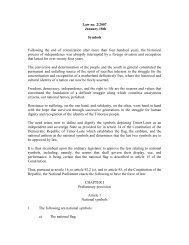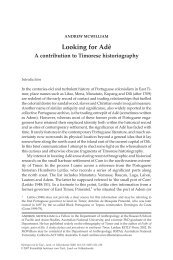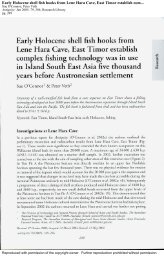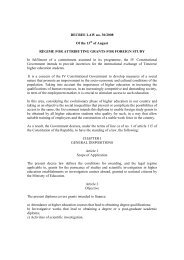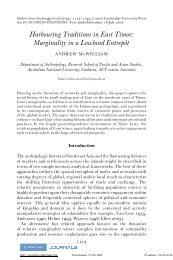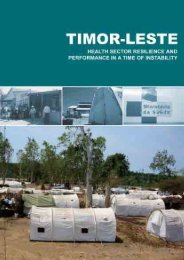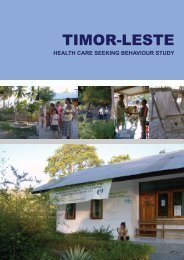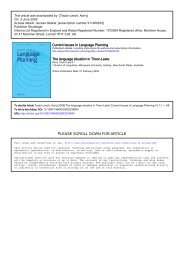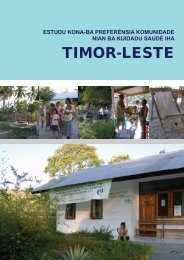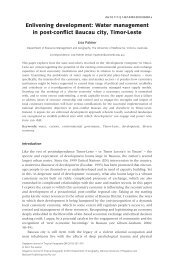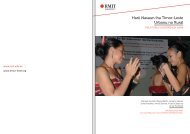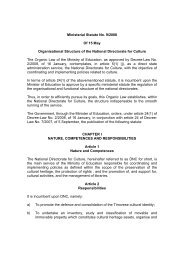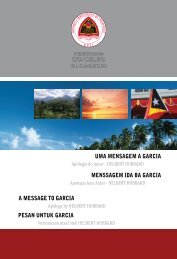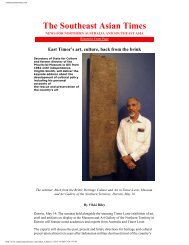Local Governance in Timor-Leste - Secretaria de Estado da Arte e ...
Local Governance in Timor-Leste - Secretaria de Estado da Arte e ...
Local Governance in Timor-Leste - Secretaria de Estado da Arte e ...
- No tags were found...
Create successful ePaper yourself
Turn your PDF publications into a flip-book with our unique Google optimized e-Paper software.
struck between values and worldviews, there was general agreement that both lisanand <strong>de</strong>mocracy can and should "walk together".An issue that arises <strong>in</strong> discuss<strong>in</strong>g coexist<strong>in</strong>g <strong>in</strong>stitutional structures is that ofterm<strong>in</strong>ology—and the theoretical assumptions that surround the concepts of traditionand mo<strong>de</strong>rnity. At one level, it may appear <strong>in</strong>consistent to <strong>de</strong>scribe the contemporary<strong>in</strong>digenous political systems of the <strong>Timor</strong>ese as 'traditional' given the history ofsubversion through <strong>in</strong>direct rule, discussed <strong>in</strong> chapter four of this thesis. Throughoutthe different stages of colonisation by the Portuguese, then of post-colonialcolonisation by the Indonesians, the foreign occupiers each recognised and subvertedtraditional governance arrangements <strong>in</strong> different ways, but they did not leave thesearrangements untouched. Boun<strong>da</strong>ries were changed, populations were moved, somegroups were empowered over other groups. K<strong>in</strong>gs were conquered, and smaller pettyk<strong>in</strong>gs who were more amenable to control were given lea<strong>de</strong>rship <strong>in</strong> their place. Just asimportantly, <strong>Timor</strong>ese lea<strong>de</strong>rs engaged strategically with the state system, be<strong>in</strong>g givendifferent political, military and economic resources that empowered them beyond thechecks and balances of the pre-exist<strong>in</strong>g traditional governance systems. In addition,there were broa<strong>de</strong>r global forces at play that impacted on <strong>Timor</strong>ese society. Thisbecame more pronounced follow<strong>in</strong>g World War II as Portuguese colonial policychanged yet aga<strong>in</strong>, result<strong>in</strong>g <strong>in</strong> new power bases for people to source throughchang<strong>in</strong>g economic, educational and vocational opportunities.These historical forces all raise the question: if traditional <strong>in</strong>stitutional structures werealtered so significantly by external forces, with some aspects becom<strong>in</strong>g part of thestate apparatus, how can they still be consi<strong>de</strong>red traditional? This is an importantquestion to ask, and has been approached by some authors by us<strong>in</strong>g the term'customary' (see for example Bennett, 2004, Elias, 1956). However, such attempts toreplace traditional with customary raises equally difficult questions as to what comeswith<strong>in</strong> the realm of 'custom' and what should be left out. Others prefer the term'<strong>in</strong>formal' to dist<strong>in</strong>guish it from the 'formal' state apparatus (see for example Lauth,2000, Cott, 2006). However, this is only useful term<strong>in</strong>ology if there is no staterecognition of traditional <strong>in</strong>stitutions. In addition, this term<strong>in</strong>ology fails to recognisethe importance of non-traditional, <strong>in</strong>formal <strong>in</strong>stitutions that are important features ofany society (see for example March and Olsen, 1989, North, 1991). And yet others5


